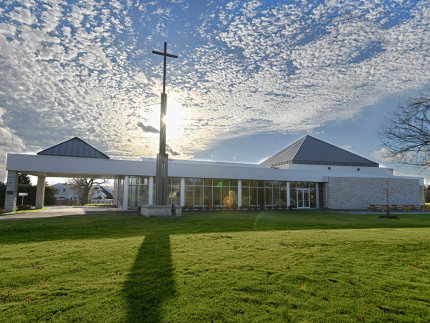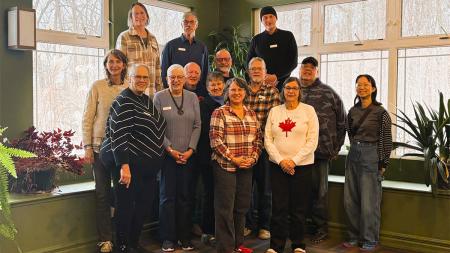Learning to Pivot: A Story of Church Renewal

When Barrhaven Fellowship CRC in Ottawa, Ont., had its first conversations about building a new facility in 2013, it had no idea how events would unfold.
At the time, the church’s pulpit was vacant, and a search team was working on calling a new pastor, Rev. Rick Nanninga. The congregation also had visions of providing more space for worship and ministry, and of increasing their ability to partner with and serve the surrounding community.
Three years later, Nanninga was well into his role as Barrhaven Fellowship’s pastor, and the congregation voted to approve a capital campaign. Their plan was set . . . and then things got complicated.
First, policy issues with the local municipality and a national train company caused unexpected delays to the new building project. After a few years of prayer and advocacy, as well as significantly increased costs, the policy issues were resolved and a path forward became clear. The congregation breathed a sigh of relief, moved to a neighboring church building so that theirs could be demolished, and praised God as construction began.
Then, just as they were ready to move into the new facility in March 2020, the COVID-19 pandemic closed everything down. Nanninga was able to work from the new building, but he was the only one there. He would preach to a camera, and the congregation would watch recordings, and eventually the congregation was able to livestream its worship services.
In November 2020, the congregation held a building dedication service with no one in the building. As time went on and COVID restrictions continued, the congregation learned to adapt – opening with limited capacity, observing masking and social-distancing requirements, and limiting the church’s programming.
By the time church activities and ministries were able to return to “normal” in 2022, six years had passed since the original capital campaign plan had been approved. Nanninga was now preparing for his own departure and retirement, and Barrhaven Fellowship’s in-person worship attendance and ministry programs were not returning to pre-COVID levels.
In congregational life and ministry “there are many things that you don’t have control over,” said Lesli van Milligen, codirector for Thrive. “What struck me about Barrhaven Fellowship is how they responded to these things. They decided to be proactive rather than reactive, and to be deliberate in raising up new leaders to respond to their new reality.”
Many Christian Reformed churches across North America are going through struggles. Whether they are still recovering yet from the pandemic, dealing with membership decline, navigating tensions over human sexuality issues, or responding to pastor burnout, many church councils are feeling discouraged and stressed. As staff from Thrive interact with churches, they hear many stories and offer support, encouragement, and resources.
“We want to let folks know that they are not alone (many others are also struggling), that we [denominational staff] are here to help, and that there is hope,” said van Milligen. “We hope that sharing one congregation’s story of struggle and new beginning will be inspirational.”
In her previous role as a regional catalyzer with Christian Reformed congregations in eastern Canada, van Milligen had had several conversations with Nanninga and the council of Barrhaven Fellowship. Because of this relationship, Nanninga reached out to her one day to talk about what was going on in the church.
“I knew my retirement was coming up, and I thought it would be important to slow down, think about who we are, and figure out some processes to set us up better for the transition of my leaving,” he said. “We actually saw lots of things coming. . . . We wondered, ‘How can we do this well?’”
He asked van Milligen for advice, and she recommended that he read the book How to Lead When You Don’t Know Where You’re Going by Susan Beaumont.
“That was useful,” said Nanninga. “We had a couple of conversations about the book with a small group. We offered it to others, and as a leadership team we picked it up as something to dig into deeply. Out of that came a relationship as we got to know and trust each other.”
“Pastor Rick was a major factor there,” added John Scholman, an elder at Barrhaven Fellowship who had been chair of council at that time. “He had this way of telling us not to worry, and to simply listen. The wisdom of his perspective was great. He was the pastor we needed over the past 10 years to get through all of this. We did have council members who were anxious, and yet he kept bringing it back to a place of not jumping too quickly because we think we need to have everything running right away.”
Following their book discussion, the council of Barrhaven decided to ask van Milligen’s husband, Rev. Tom van Milligen, to lead them in a time of prayer and discernment.
“What struck me when I encountered this congregation,” said Tom, “was that I didn’t sense anxiety. When you are anxious, it is really hard to discern. You are only looking at the thing that makes you afraid, and you tell God what he has to fix. That wasn’t what I encountered at Barrhaven.”
Instead there was a spirit of trust that God would guide the congregation in this liminal time. Building off this spirit, Tom van Milligen led a time of prayer and discernment that was open to everyone in the congregation. And insights from all participants were considered.
“The biggest thing for me was not just going through the materials but broadening the conversation with the whole council and other congregation members,” said Scholman.
“They had a small group that engaged with some of these ideas, but then they expanded that group further and further,” added Lesli van Milligen. “It didn’t just rest on the pastor or even the council to have the vision. They really invited other people in and encouraged them to see themselves as having the gifts to help discern. Everyone felt that they belonged and could speak – people who had been there a long time and people who were really new. They could all participate. The community story belonged to the whole community.”
During the event, Tom van Milligen helped participants explore their history and understand their story from the past to today. Then he led them in a listening prayer that, Scholman said, “confirmed that we don’t need to radically change what we are doing.”
Ideas and impressions that came up included pictures of a lighthouse, angels around the church, and places of safety and sanctuary, he said. “These showed that we are already in a position where people are feeling drawn, connected, and comfortable. We need to carry through on that.”
As a next step, Tom van Milligen led the congregation through a tool known as Thriving Essentials, a four-hour course that helps all the ministry leaders of a church—elders and deacons, volunteers and staff, newbies and old-timers—get aligned on core concepts of mission, discipleship, discernment, and leadership.
“That woke a few more people up to understanding where we are as a congregation,” said Scholman.
“Thriving Essentials gave the church a framework for mission and discernment and opened their eyes to what God is up to,” added Lesli van Milligen.
They recognized that God had been doing new and exciting things in their midst. This included an influx of newcomers from many different countries.
“The word diversity for our church used to mean which province in Holland our ancestors came from,” Nanninga joked. “This is not the case anymore. New people started coming – from the Congo, Taiwan, and Latin America. God brought them here. When I lead a newcomers class, I tell everyone, ‘We prayed for you, and we are very thankful you are here.’”
Creating space for these newcomers to bless the congregation has been a key next step in Barrhaven’s development. Nanninga shared several examples of new members’ stepping up to lead a prayer ministry or to prepare food in the kitchen.
“They have immediately felt welcomed, and they, in turn, have blessed us,” he said. “It blows us away. It is a God thing. It can’t be anything else.”
In addition, going through this process as a congregation has helped the church see themselves more clearly, with a better understanding of their mission. Nanninga noted that after Synod 2022’s decisions about human sexuality, members who found themselves at opposite ends of the spectrum on this issue were able to put differences aside.
“You could tell that our current narrative was much more compelling to people than the difficult discussions happening in our denomination,” he said. “Even those who are at the far ends of the spectrum were able to embrace and say that while they don’t agree, they respect each other as brothers and sisters.”
Nanninga retired in September 2023 and delivered his last sermon at Barrhaven Fellowship on Sept. 3. He reflected, “This congregation has gone through a wilderness for a number of years. We worked through it. What came out of this whole process was the sense that we are OK where we are. That ultimately it is not a matter of setting and reaching goals. It is more organic, something God is doing through us. During this upcoming period of vacancy, the congregation will need to continue to be what they’ve been . . . a non-anxious presence that continues this conversation and responds to what God is doing.”
Scholman agreed: “The need to discern rather than decide was something many people commented on throughout this process. We have to stick to that now. It has set the framework for where we need to keep going. We need to keep listening.”
Tom van Milligen said he thinks this is a lesson that could bless other congregations as well. “Trust the process,” he said. “Sometimes we can feel in the wilderness, but we need to keep pursuing what God has lined out for us, even though things aren’t going our way. Keep moving. Not in a stubborn or unaware way, but being faithful to what God is giving you.”


